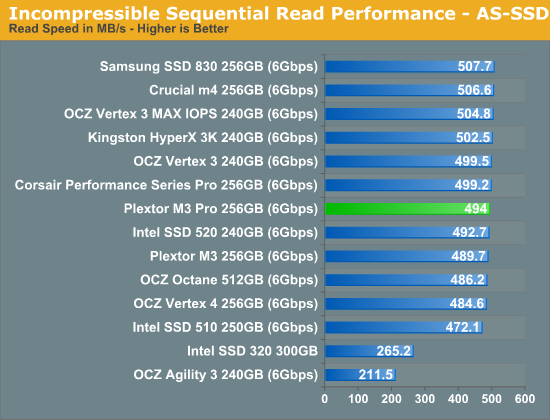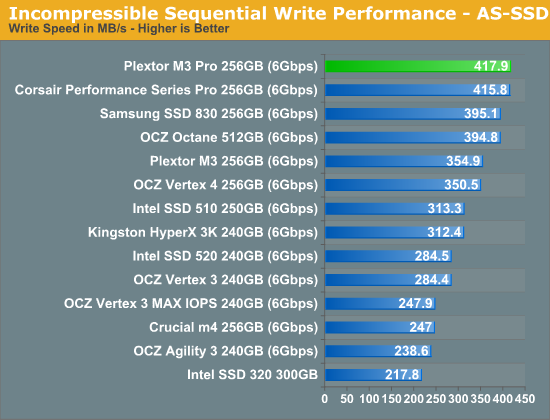Plextor M3 Pro (256GB) Review
by Kristian Vättö on July 1, 2012 1:45 PM ESTAS-SSD Incompressible Sequential Performance
The AS-SSD sequential benchmark uses incompressible data for all of its transfers. The result is a pretty big reduction in sequential write speed on SandForce based controllers, while other drives continue to work at roughly the same speed as with compressible data.

As I've said before, incompressible sequential read speed testing is very unsurprising nowadays to say the least, and the M3 Pro doesn't make an exception. It's 4.3MB/s (0.9%) faster than the M3 but when that is translated into percentages, we're essentially within the margin of error.

Incompressible sequential write performance, on the other hand, is another story. The M3 Pro comes out as the fastest drive we have tested, although it beats Corsair Performance Series Pro by only 2.1MB/s. However, the difference between the M3 and M3 Pro is 63MB/s (~18%), which is fairly significant.










55 Comments
View All Comments
etamin - Wednesday, July 4, 2012 - link
Not sure if anyone mentioned this but the Vertex 4 (now firmware v1.4) can really use an update in both the charts (on newly reviewed SSDs) and in the SSD bench.Kristian Vättö - Thursday, July 5, 2012 - link
Just spoke with Anand, he promised that the updated results will be in Bench later this week. I'll also do a quick article about the results, should be up early next week or so unless something comes up (hint: I have a package coming from Plextor which needs urgent attention ;-)etamin - Thursday, July 19, 2012 - link
Awesome! just saw the updates in the Plextor M5S review!SSD_Privacy - Monday, July 9, 2012 - link
In the review you explain the features of Plextool,, but you do not say whether you actually used it and whether it actually erases data. This is very important as a study done at UCSD www.usenix.org/events/fast11/tech/full_papers/Wei.pdf showed that some SSD drives do not erase data even when they report that they have.This is a subject that this site has never addressed or even acknowledged.
msawyer91 - Thursday, August 30, 2012 - link
As a freelance software developer of a tool called WindowSMART 2012, which assess the health of hard disks and SSDs, and alerts you via email and on Apple and Android mobile devices, I had a need for SSDs.Since each SSD controller manufacturer (i.e. Marvell, SandForce, Micron) implements SMART attributes differently, I had a need to acquire SSDs (at quite an expense). I trolled the waters looking for the best deals. Some SSDs I looked to buy, knowing I would be selling them on eBay once I was done testing them. Others I was electing to keep, choosing to upgrade laptops to boost their speed. Throw in a caddy from newmodeus.com and I instantly had a dual-drive laptop--SSD for the OS and hard drive for the data. Talk about breathing some new life into a computer!
A few months ago I found this very SSD, the Plextor M3 256 GB, on Newegg. It was on sale for $199.99, and I couldn't pass it up. It had a solid 5/5 egg rating from over 300 reviewers, and finding an SSD at less than a dollar per GB? I was sold. I installed it in a laptop that's functioning as a SharePoint 2010 test server. With the SSD alone, I was easily trimming 10 seconds off of initial page loads. SharePoint is a beast, and a laptop isn't exactly the best suited machine for SharePoint. But for testing and tinkering, it suited my needs.
And this Plextor SSD made that laptop (an HP G60-230US) a whole lot faster. Well done Plextor! You've got a winner in this SSD.
If you want to check out the WindowSMART 2012 tool I put together, you can find it at http://www.dojonorthsoftware.net/TBM/WindowSMART.a...
Matt